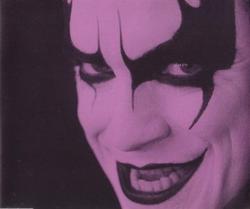Postmodernism as pathology, part II
Sat. February 17, 2007Categories: Abstract Dynamics
 |  |
The thing is, Robbie, there’s no rehabilitation from PoMo.
The sickness that afflicts Robbie Williams is nothing less than postmodernity itself. Look at Williams: his whole body is afflicted with reflexive tics, an ego-armoury of grimaces, gurns and grins designed to disavow any action even as he performs it. He is the ‘as if’ Pop Star – he dances as if he is dancing, he emotes as if he is emoting, at all times scrupulously signalling – with perpetually raised eyebrows – that he doesn’t mean it, it’s just an act. He wants to be loved for ‘Rudebox’ but, unfortunately for him, his audience demands the mawkish sentimentality of ‘Angels’. How Robbie must hate that song now, with its humbling reminders of dependency (Williams’ career went into the stratosphere on the basis of ‘Angels’) and lost success…
Let me entertain you, let me lead you
There’s surely a Robin Carmody-type analysis to be done of the parallels between Williams and Tony Blair. Williams’ first album, the tellingly-titled Life Thru a Lens was released in 1997, the year of Blair’s first election victory. There followed for both a period of success so total that it must have confirmed their most extravagant fantasies of omnipotence (Blair unassailable at two elections; Williams winning more Brit awards than any other artist). Then, a decade after their first success, an ingominious decline into irrelevance (the post-Iraq Blair limping out of office as a lame-duck leader, Williams releasing a disastrous album and checking himself into rehab on the day before this year Brit awards, at which he had received a derisory single nomination). Of course, there are limits to the analogy: Blair is popular in the States, whereas Robbie…
Williams and Blair are two sides of one Joker Hysterical face: two cracked actors, one given over to the performance of sincerity, the other dedicated to the performance of irony. But both, fundamentally, actors – actors to the core, to the extent that they resemble PKD simulacra, shells and masks to which one cannot convincingly attribute any inner life. Blair and Williams seem to exist only for the gaze of the other. That is why it is impossible to imagine either enduring private doubts or misgivings, or indeed experiencing any emotion whose expression is not contrived to produce a response from the other. As is well known, Blair’s total identification with his publicly-projected messianic persona instantly transforms any putatively private emotion into a PR gesture; this is the spincerity effect (even if he really means what he is saying, the utterance becomes fake by dint of its public context). The image of Blair or Williams alone in a room, decomissioned androids contemplating their final rejection by a public which once adored them, is genuinely creepy.
It is perfectly possible to imagine Robbie exhibiting public doubts, of course – indeed, as his former reflexive potency declines into reflexive impotence, he is most likely to be seen insisting upon his inadequacy and failure. No doubt this is why Williams’ announcement of his ‘addiction’ to anti-depressants and caffeine has been greeted with a certain scepticism (suspicion has been aroused in part because of the timing of the announcement, on the eve of the Brits). But this scepticism misses the point. Williams’ sickness is, precisely, his incapacity to do or experience anything unless it provokes the attention of the other.
Or: as Liam Gallagher more succinctly put it, in words worthy of Mr Agreeable at his compassionate best:
“If you’ve got a fucking problem, why do you want the whole world to know about it?.
I say sort yourself out. You make a fucking crap album then want everyone to feel sorry for you.
What a fucking tosser.